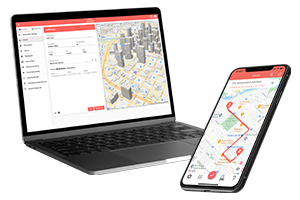Rebeka Barefield
April 16, 2024
Airbnb hosting is not just about offering a welcoming space to guests but also about effectively managing a unique small business. This guide delves deeply into the financial intricacies of Airbnb hosting, focusing on mileage and expense deductions that can help you maximize your profits and maintain tax compliance.

Airbnb Expenses: A Primer for Hosts
When you get started with an Airbnb or other hosting business, such as Booking.com or Guesty, understanding and managing your expenses is crucial. Here are the primary costs associated with becoming a host that you should take into account:
- Mortgage or Rent: Typically the largest expense, whether you own or lease your property.
- Utilities and Internet: Guests expect these services, which may cost more due to increased usage.
- Cleaning and Maintenance: Regular upkeep is essential for guest satisfaction and can quickly accumulate in cost.
- Supplies: This includes everything from toiletries to items for welcome baskets.
- Insurance: Investing in insurance for short-term rentals is advisable to cover potential damages.
- Service Fees: Airbnb’s booking fees vary based on your host plan.
- Taxes: As self-employed individuals, hosts are required to prepare and pay their own taxes. Make sure to set aside enough to pay the required estimated quarterly taxes.
Unexpected costs often arise, such as emergency repairs or the need for premium furnishings to stay competitive. Understanding these expenses is the first step in maximizing your rental’s profitability.
Tracking Airbnb Expenses and Income
Effective management of finances is key to successful Airbnb listings. Tracking income and expenses gives you a clear overview of where your money goes and which location and time of the year gives you the most profit. It is also the key to optimizing your spending by identifying where you can cut back. Moreover, meticulous records are necessary to prove your income to pay taxes and maximize your deductions.
Here are a few tips on how you can keep meticulous records:
- Dedicated Financial Accounts: Use separate bank accounts and credit cards for business transactions to simplify tracking.
- Detailed Record Keeping: Save all receipts and make detailed notes for each transaction.
- Software Solutions: Consider using financial tools like QuickBooks to automate tracking and categorize expenses efficiently.
- Hiring an accountant: Engaging a Certified Public Accountant (CPA) can offer crucial advice on the specific expenses vacation rental hosts need to monitor. Their expertise in local tax laws ensures your taxes are accurately and timely filed, giving you confidence and peace of mind.
Freelancer Taxation and Deductions
Airbnb landlords are treated as independent contractors, which impacts how you report income and claim tax deductions. They are required to pay quarterly estimated taxes and to file an annual income tax return. Here are the main aspects of freelancer taxation:
Self-Employment Tax
Self-employment tax constitutes a major component of taxes for 1099 earners, encompassing Social Security and Medicare contributions. While traditionally employed workers share these costs with their employers, self-employed individuals must pay the full 15.3% of their net earnings. This percentage includes a 12.4% Social Security tax up to a specified income ceiling, and a 2.9% Medicare tax without any income limit.
Income Tax
Earnings you report on a 1099 form are also liable for federal income tax. The applicable rate varies based on the individual’s total taxable income and their filing status, aligning with IRS tax brackets that range from 10% to 37%.
Estimated Tax Payments
Since self-employed income doesn’t automatically have taxes withheld, earners are typically required to make quarterly estimated tax payments. This prepayment method helps mitigate the risk of underpayment penalties and eases the financial burden of having to pay a large sum all at once during tax season. The primary challenge here is accurately calculating these estimated taxes.
Deductions and Business Expenses
Individuals earning income to be reported on the 1099 IRS form can lower their taxable income through deductions for business-related expenses. Eligible deductions often include costs for office supplies, home office operations, travel, and health insurance premiums. Thoroughly documenting these deductions can considerably lessen the total tax liability.
State Taxes
In addition to federal taxes, 1099 earners may also be subject to state income taxes, depending on their state’s rules and tax rates. Some states, however, do not levy an income tax.
Mileage Deductions: Maximize Your Returns with MileageWise
For Airbnb owners managing multiple properties or those who travel frequently for business tasks, tracking mileage is essential. This is because they can deduct a set amount per every business mile traveled, let that be from traveling between listings to running errands. This amount is determined by the yearly IRS mileage rate. Using tools like Mileagewise ensures that you keep accurate mileage logs for tax purposes. Its features include:
Automatic Tracking
The app runs in the background and logs every mile automatically. Unlike other mileage tracking apps, it does not monitor your every movement, but logs your arrivals and calculates your distances. This saves battery usage and grants compliance with privacy guidelines.
Vehicle expense tracking
The built-in expense tracker enables users to track maintenance costs, refuelings/chargings, car cleaning, and more. Tax returns according to actual expenses are beneficial for those who operate more expensive vehicles that may come with more expenses that the rate set by the IRS might not cover.
User-friendly interface
Add your vehicles, odometer readings, headquarters, clients, and trip purpose classifications with ease.
IRS Compliance
Your prepared printable logs are designed to meet IRS standards and help you withstand audits with the help of our built in Auditor, that reviews and corrects up to 70 logical inconsistencies in your log.
Download MileageWise’s automatic mileage tracker app from Google Play or the App Store & try it for free for 14 days. No credit card required!

Additional Tips
Beyond basic expenses, consider investing in amenities that enhance guest satisfaction, such as high-speed internet, entertainment options, and comfortable furnishings. These investments not only improve reviews and booking rates but can also be written off as business expenses.
Furthermore, stay informed about local regulations that could impact your hosting duties, such as city taxes or licensing fees. Understanding these regulations can prevent unexpected fines and fees, which are also deductible.
FAQs
How do Airbnb hosts pay taxes?
Hosts pay income tax on earnings and self-employment tax as applicable. They are required to pay quarterly estimated taxes and to file an annual income tax return.
What qualifies as a deductible business expense for an Airbnb host?
Any expense that is ordinary and necessary for running your Airbnb business qualifies as deductible. This includes but is not limited to hosting supplies, property repairs, cleaning costs, office supplies, professional services (like accounting and legal fees), furniture, vehicle expenses/mileage, and marketing costs. Ensure that these expenses are directly related to your rental activity to qualify.
What is an office expense?
An office expense refers to costs associated with the day-to-day operations of a business’s office. These expenses can include payments for rent, utilities, furniture, office supplies, and equipment necessary for the administration and management of the business.
How do I handle occupancy taxes for Airbnb rentals?
Occupancy taxes, sometimes called hotel taxes or tourist taxes, are assessed by local governments on short-term rentals. You may be required to collect these taxes from your guests and remit them to the appropriate tax authority. Airbnb automatically collects and remits occupancy taxes in some locations, but it’s important to confirm your responsibilities in your specific location.
Is there a limit to how much I can deduct for mileage expenses as an Airbnb host?
The IRS sets a standard mileage rate each year (e.g., 58.5 cents per mile for 2022), which you can apply to the miles driven for business-related activities, such as trips to the store for supplies or services related to your rental. There is no upper limit to the mileage you can claim, as long as it is properly documented and exclusively business-related.
How does Mileagewise ensure accuracy in mileage tracking for tax purposes?
Mileagewise ensures accuracy in mileage tracking by using automatic GPS-based logging, which captures every mile driven for business purposes without requiring manual input from the user. This feature guarantees that the records comply with IRS requirements, helping hosts withstand audits.
For simplified record-keeping, Mileagewise offers features such as a user-friendly interface to enter vehicle details, odometer readings, and trip purposes. Additionally, it includes a built-in expense tracker to manage maintenance costs and other vehicle-related expenses, streamlining the process of documenting and filing tax returns.
Conclusion
Successfully managing your Airbnb expenses and understanding the tax implications are crucial to maximizing your hosting profits. Tools like Mileagewise, along with meticulous record-keeping, play pivotal roles in ensuring financial efficiency and tax compliance. Always consult with a tax professional to tailor your financial strategies to your specific situation, ensuring you leverage every possible deduction.
By enhancing your understanding of these financial and operational aspects, you can turn your Airbnb hosting into a more profitable and rewarding endeavor.
Download MileageWise’s automatic mileage tracker app from Google Play or the App Store & try it for free for 14 days. No credit card required!
| MileageWise | TripLog | MileIQ | Everlance | Driversnote | SherpaShare | Hurdlr | Excel | |
User Ratings (Trustpilot) | N/A | N/A | N/A | |||||
iOS App User Ratings | ||||||||
Android App User Ratings |
| |||||||
Average Possible Business Mileage Deduction | $12,000 | $6,300 | $8,400 | $6,500 | $6,000 | $5,600 | $5,600 | $200-$2,000 |
Imports Trips and locations from Google Timeline | ||||||||
Produces IRS-Proof Mileage Logs | ||||||||
Creates Retrospective Mileage Logs | ||||||||
AI Wizard Technology for Mileage Recovery | ||||||||
| Sampling / Recurring Daily Trips | ||||||||
| Mass Distance Calculation | ||||||||
| Built-In IRS Auditor for 70 Logical Conflicts Correction | ||||||||
| Web Dashboard | ||||||||
| Mileage Tracker App | ||||||||
| Vehicle Expense Tracker | ||||||||
| Manual Trip Recording | ||||||||
| Bluetooth Auto Tracking - with no hardware needed | ||||||||
| Plug'N'Go Auto Tracking | ||||||||
| Vehicle Movement Monitoring | ||||||||
| Battery and Data Friendly | ||||||||
| Other Software Integrations | ||||||||
| Trip List Import from other Mileage Trackers | ||||||||
| Trip List Import from GPS | ||||||||
| Shared Dashboard for Teams | ||||||||
Features are all related to mileage tracking | ||||||||
Pricing | Price list | Price list | Price list | Price list | Price list | Price list | Price list | Price list |
| FEATURE | BRONZE | SILVER | GOLD |
| Google Timeline Import | |||
| Past Mileage Log Reconstruction | |||
| Trip list import from third-party data | |||
| Sampling / Recurring Daily Trips | |||
| Shared Dashboard for Teams | |||
| Vehicle-Client Pairing | |||
| Mileage log is also downloadable in Excel and CSV | |||
Unlimited Trip Tracking | |||
| Vehicle Expense Tracking | |||
Mass Distance Calculation | |||
| Automatic IRS-Proof Mileage Log Creator | |||
| Client+Location Import from Excel and other data | |||
| Free Unlimited Phone Support with Live Agent | |||
| Automatic Mileage Tracker App | |||
| Business / Personal Trip Auto-Classification | |||
14-Day Free Trial | |||
| Up-to-date Standard Mileage Rates list | |||
| Secure Web Dashboard | |||
| Up-to-date Help Articles, Private User Forum | |||
Free Car Exchange | |||
| IRS-Proof Mileage Logs | |||
| Built-In IRS Auditor feature on Your Side | |||
Option to pay in monthly recurring installments* | |||
No Extra Charges and Hidden Fees |



